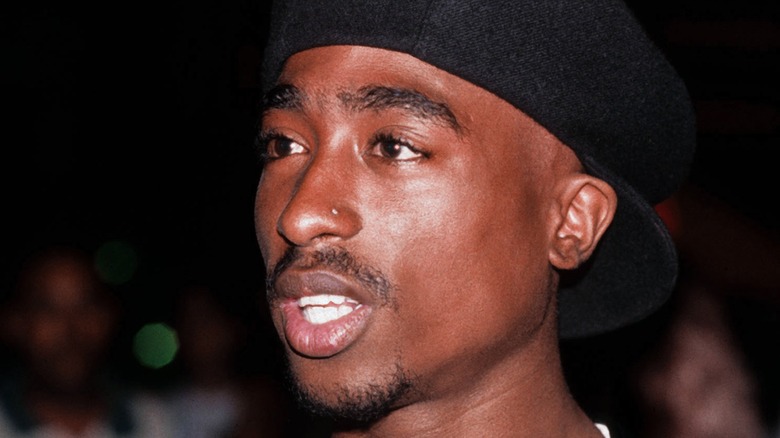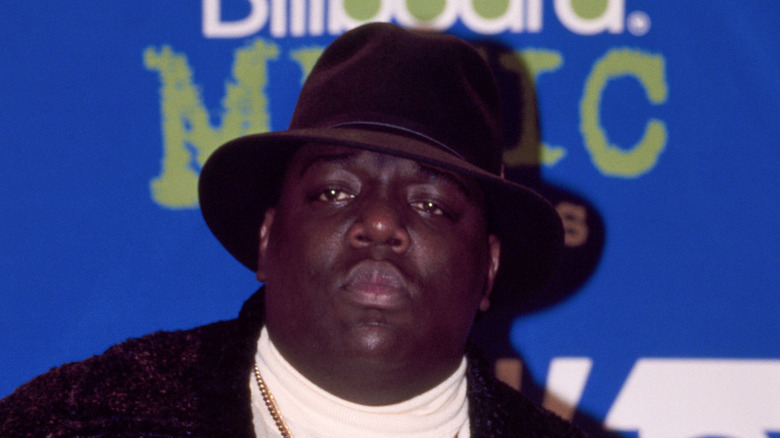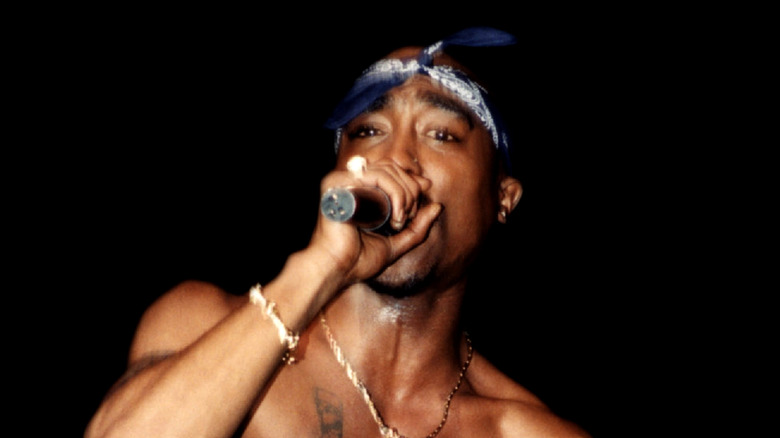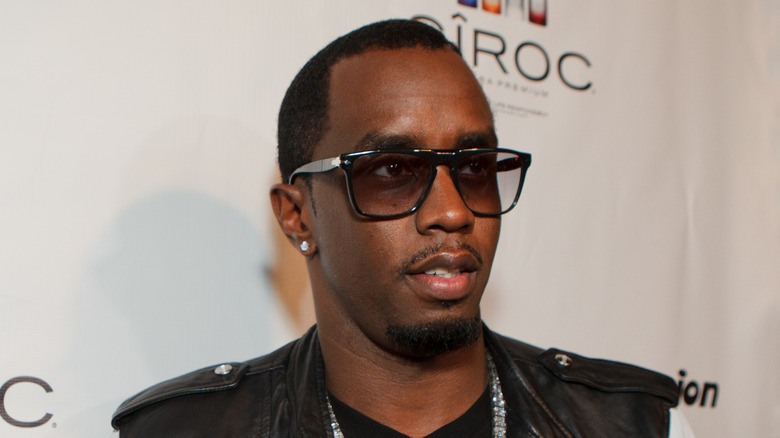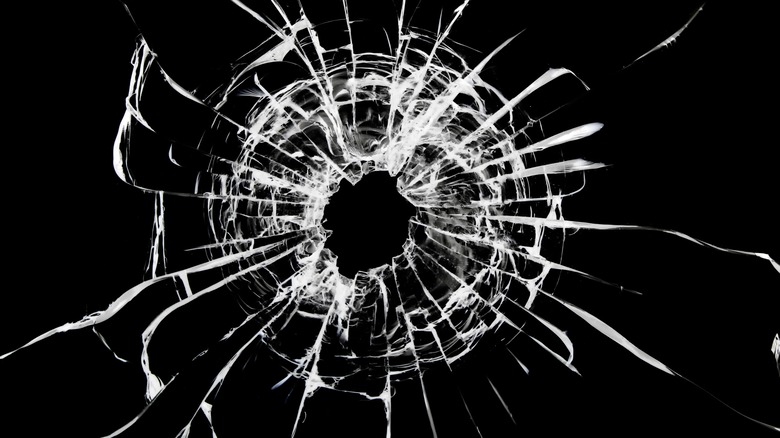What Sparked 2Pac's Infamous Diss Track To Biggie Smalls
The rap game is infamously cemented with some of the most intense and enduring rivalries in music history — some of which have remained steadfast long after the artists' deaths. Most of us are at least broadly familiar with the notorious (no pun intended) feud between West Coast/East Coast rappers in the early 1990s when artists like N.W.A., Snoop Dogg, 2pac, and Biggie Smalls were dominating the rap charts and spitting vitriol back and forth in the form of song and rhyme. At the core of it all, there was a vicious animosity that actually manifested itself in physical violence at times, but even in the absence of blood, rappers were licking shots back and forth with words that hit like hot bullets from a smoking gun. "Diss tracks" were songs that artists would put out to publicly spite one another, and you can bet that they got pretty gutless at times.
As The Daily Beast reports, one such song was so personal and spiteful, it earned the title of "the most savage diss track ever" and has maintained it for nearly three decades. In 1996, the late Tupac Shakur released "Hit 'Em Up," a diss track that called out several of his East Coast nemeses and threatened retaliation for an attempt on his life. The song's centerpiece and primary target was legendary New York rapper Biggie Smalls, and 2Pac offered no shred of mercy in his rhythmical diatribe that became a rap music monument.
What inspired Hit 'Em Up?
On November 30, 1994, Tupac Shakur, his manager Freddie Moore, and their friend Randy "Stretch" Walker were walking into Quad Recording Studios in Manhattan when they were descended upon by three armed men. In the midst of the scuffle, Shakur was shot five times — twice in the head, according to The New York Times — and his assailants made off with $40 thousand dollars of his personal jewelry as well as all the cash he had on him (via The Source). The "California Love" rapper made a miraculous recovery and, against all natural odds, even appeared in court the following day for assault charges he was battling at the time. Shakur was sentenced to two to four years behind bars (though he only ended up serving nine months), and within that time, he became possessed with the notion that the so-called "robbery" may actually have been an assassination attempt on his life, as Song Meanings + Facts reports.
He'd surmised that several entities in the New York rap game were responsible for organizing the hit that nearly put him in the grave. Among those prime suspects were Bad Boy Records CEO Sean "P. Diddy" Combs and rival rapper Christopher Wallace — otherwise known as The Notorious B.I.G. While no credible evidence ever surfaced to substantiate Shakur's accusations, that didn't stop him from dragging the men's names and reputations into the lyrical cyclone of spite that was "Hit 'Em Up" just a few years later (via Song Meanings + Facts).
Hit 'Em Up called out people by name
"Puffy tryna see me / weak hearts I rip / Biggie Smalls and Junior M.A.F.I.A. is some mark-a** b****** / We keep on comin' while we runnin' for your jewels ..." Given that "Hit 'Em Up's" lyrics are vivaciously explicit from start to finish, there's only so much transcribing we can do here. All the same, you can see how personal the California-based rapper gets in calling out his rivals by using their actual names. He goes on to accuse them directly of tactfully coordinating the robbery that almost killed him and threatens prompt retaliation in the chorus: "Grab your Glocks when you see 2Pac, Call the cops when you see 2Pac, Who shot me? But you punks didn't finish, Now you 'bout to feel the wrath of a menace" (per Genius).
The infamous music video even features a Biggie Smalls dopplegänger who is mocked and gestured at insultingly by Tupac Shakur throughout. According to Biography, the two rappers had a friendship before they got involved with street gangs and rival music labels. Tragically, their affiliations ultimately culminated in their untimely deaths. On September 7, 1996, Shakur was attacked by several gunmen outside of a Las Vegas hotel and died in a hospital bed six days later from bullet wounds at the age of 25. Smalls, despite his elevated efforts to reduce the surmounting violence between music factions, died on March 9, 1997, in a similar gang-related shooting. He was 24 years old.
P. Diddy warned Biggie not to respond to Hit 'Em Up
"When we got hit with 'Hit 'Em Up,' I had to make the call to Biggie and I said, 'we not going to respond.' Somebody's going to get hurt if we respond," Sean 'Diddy' Combs recalled in a conversation with radio DJ Big Boy back in 2018 (via Okay Player). Despite Shakur's blatant provocation and bitter threats, Smalls never released a diss track in response. According to Revolt, rapper Lil' Cease also provided a cautious warning and advised Biggie against retaliating. For better or worse, no combative diss track ever came out of the New York rapper's catalogue, and he even made sure that others kept their distance from the conflict as well.
"At the very beginning, Big didn't rush in and make a diss track," Lil' Cease remarked years later. "He told everybody, 'If you make a record, I'm not f*****' with you. If you respond to anything, you will be cut off.'" Unfortunately, even the passive gesture of taking the high ground wasn't enough to deter the violence that took both his and 2pac's lives, though there's no conclusive evidence to suggest that "Hit 'Em Up" did anything to spurn either shooting. Revolt reports that 2pac and Biggie Smalls never spoke to one another after the song came out, but fellow rapper Snoop Dogg later shared that he noted significant grief in Smalls' demeanor after the news of his old friend's murder broke.
Dexter Isaac's confession
In 2011, convicted murdered Dexter Isaac confessed to participating in the 1994 armed robbery of Freddie Moore, Randy Walker, and Tupac Shakur that left the latter on the precipice of death with five bullet wounds in his body. Isaac, who is serving a life sentence for an unrelated crime, published a lengthy letter from behind bars incriminating himself and accusing certain individuals of putting him up to it. He claimed that James "Jimmy Henchman" Rosemond paid him $2,500 dollars to feign a robbery that would result in the "California Love" rapper's death (per ABC News).
"Now I'm not going to talk about my friend Biggie's death or 2Pac's death, but I would like to give their mothers some closure," Isaac shared in his omission that you can read here. "It's about time that someone did, and I will do so at a different time." Isaac goes on to accuse Rosemond of being a government informant who is directly responsible for his own lifelong stint behind bars, calling him a traitor and a murderer. He also references the alleged close relationship between Rosemond and Sean Combs, though no conclusive evidence was ever summoned to substantiate his various claims.
